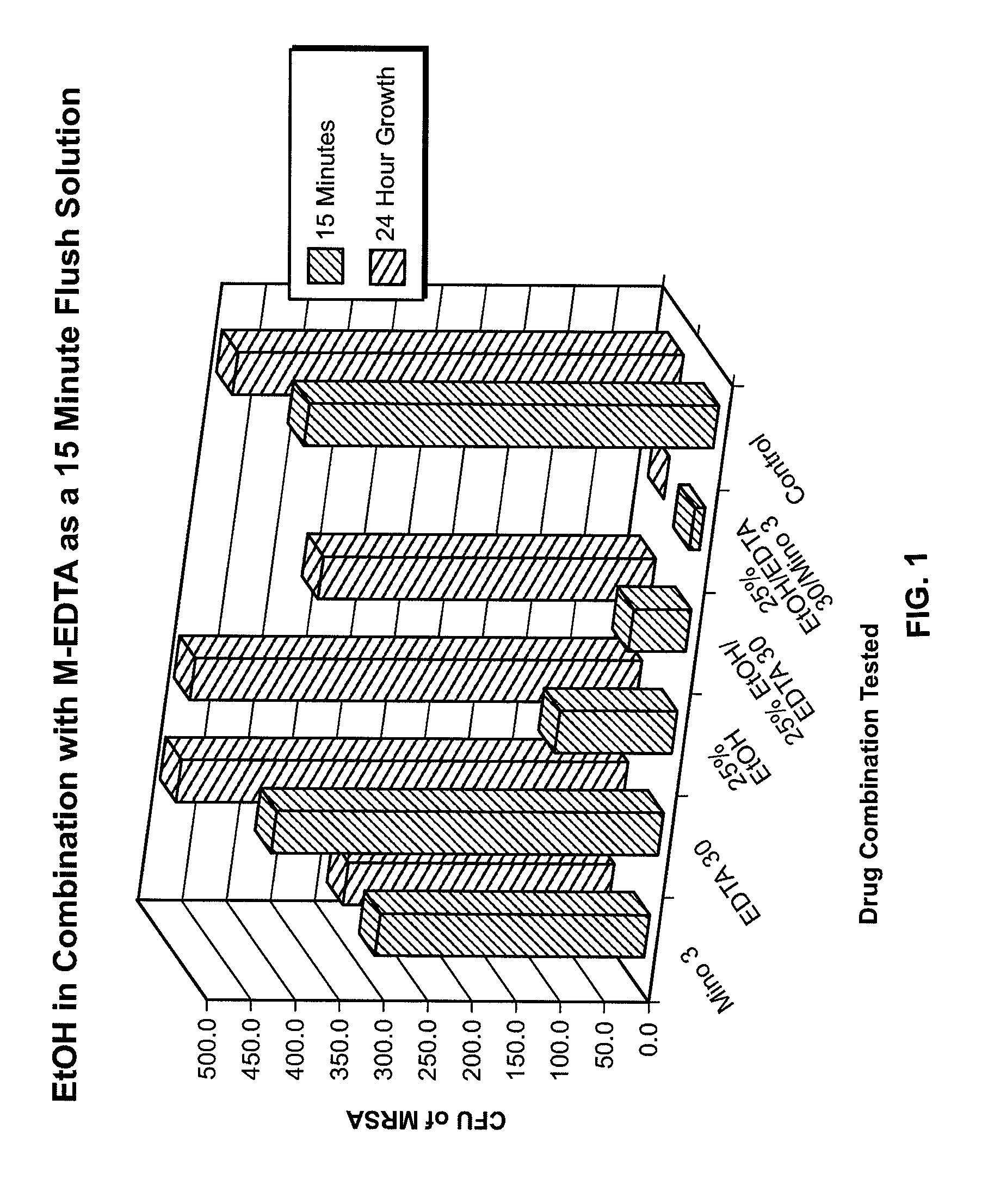Antimicrobial flush solutions
a technology of antimicrobial and solution, applied in the field of medicine and microbiology, can solve the problems of increasing the risk of vancomycin resistance, solution may not be applicable, and the infection resulting from the colonization of organisms embedded in biofilm is the most frequent complication, so as to reduce or eradicate microbial agents from the surface.
- Summary
- Abstract
- Description
- Claims
- Application Information
AI Technical Summary
Benefits of technology
Problems solved by technology
Method used
Image
Examples
example 1
Reduction and / or Eradication of Microbes Using the Modified Robbins Device Model
[0099]In vitro Model of Colonization (Modified Robbins Device). The in vitro model utilized a modified Robbins device (MRD) to study the colonization of catheter segments with organisms embedded in biofilm. The modified Robbins device has been previously described (Nickel et al., 1991; Evans et al., 1987, see also U.S. Pat. No. 5,362,754) and is constructed from an acrylic block, 42 cm long with a lumen of 2×10 mm. It consists of 25 evenly spaced specimen plugs, each connected to a silicone catheter segment (Allegiance Healthcare Corp., McGaw Park, Ill.) whose anterior surface (0.3 cm2) comes in contact with the flushed infusate. After placing the catheter segments in the specimen plug of the modified Robbins device, the entire apparatus was gas sterilized using ethylene oxide. A 500 ml 5% dextrose in water (5% D5 / W) was connected to the modified Robbins device through an intravenous tubing administratio...
example 2
Testing M-EDTA in 25% Ethanol Using the Silicone Disk Bioprosthetic Colonization In Vitro Model
[0111]The inventor next determined the efficacy of minocycline and EDTA combination in 25% ethanol in eradicating staphylococci and candida embedded in biofilm. Prevention of regrowth after reincubation was assessed using a novel silicone disk bioprosthetic colonization model. The procedure is described below.
Experimental Procedure
[0112]On day 1, pieces of biofilm were prepared. Sterile (Ethylene Oxide Gas Sterilized) silicone disks were placed in 5 ml sterile snap top Falcon tubes and 0.5 ml of pooled plasma added. This was followed by incubation (while rocking) overnight at 37° C.
[0113]On day 2, the bacteria was added to form the biofilm. Using sterile plastic transfer pipettes, the plasma was suctioned out from the tubes and replaced with 0.5 ml of bacterial inoculum (50 ml of Mueller-Hinton broth containing 4-5 colonies of freshly grown bacteria). The tubes were incubated overnight at ...
PUM
| Property | Measurement | Unit |
|---|---|---|
| dwell time | aaaaa | aaaaa |
| exposure time | aaaaa | aaaaa |
| concentration | aaaaa | aaaaa |
Abstract
Description
Claims
Application Information
 Login to View More
Login to View More - R&D
- Intellectual Property
- Life Sciences
- Materials
- Tech Scout
- Unparalleled Data Quality
- Higher Quality Content
- 60% Fewer Hallucinations
Browse by: Latest US Patents, China's latest patents, Technical Efficacy Thesaurus, Application Domain, Technology Topic, Popular Technical Reports.
© 2025 PatSnap. All rights reserved.Legal|Privacy policy|Modern Slavery Act Transparency Statement|Sitemap|About US| Contact US: help@patsnap.com

